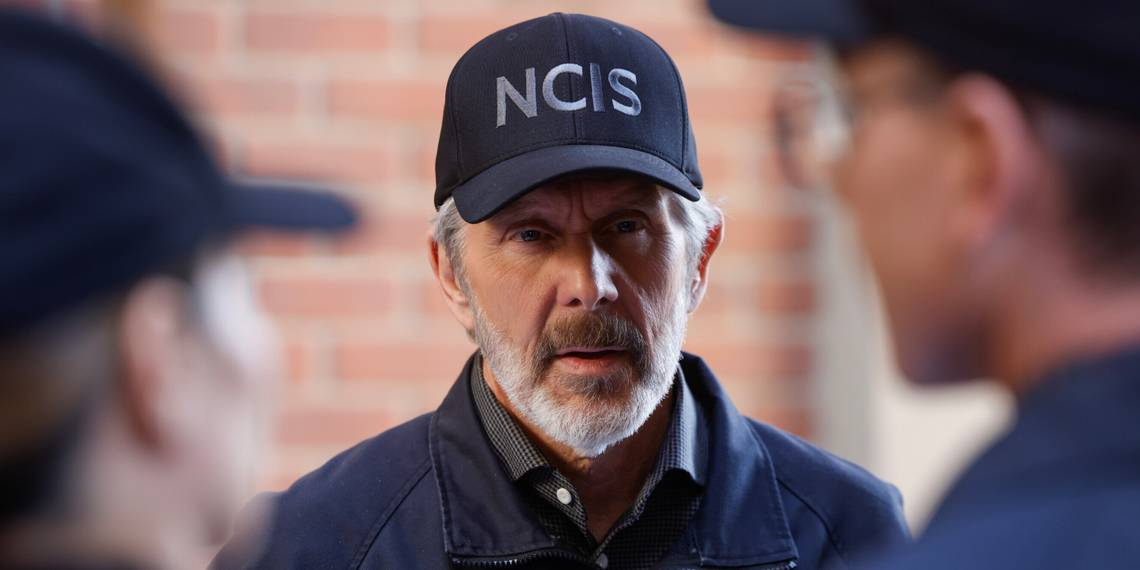
Some engines just never run out of steam. Ever since it was born via a backdoor pilot from the TV show JAG, NCIS has remained one of the small screen’s most gripping offerings. Despite the lengthy nature of each season, there’s always something unique about each episode. The same can be said of its numerous spinoffs, all of which deal with military-related criminal investigations based on the Naval Criminal Investigative Service of the United States Department of the Navy.
It would be understandable for NCIS fans not to want to watch anything else. After all, the franchise has 1,055 episodes and 49 seasons across six shows. That’s a lot of television for anyone to consume. However, those eager for something with a similar tone yet a different narrative structure have a few options for them. One of them is the BBC One procedural drama series, Vigil. The critically acclaimed show currently has two seasons, with a third on the way.
An Investigator Clashes with Servicemen in ‘Vigil’
Created and edited with a razor-shaped precision by Tom Edge, and filmed in a way that occasionally suggests a dreary and foggy Kafkaesque pseudo-reality, Vigil is as visually arresting as it is histrionically intense. The show introduces us to Detective Chief Inspector Amy Silva (Suranne Jones), a Scottish investigator struggling with PTSD and claustrophobia following a car accident that left her fiancé dead. Understandably, she longs for a period of tranquility. Instead, she is abruptly sent to HMS Vigil, a nuclear-powered Vanguard-class ballistic missile submarine, to investigate a mysterious death on board. She has been told the dead Chief Petty Officer died of a drug overdose, but she doesn’t believe it. Meanwhile, the vessel continues on a secret, high‑stakes mission.
For someone suffering from claustrophobia, being on board a military vessel proves to be quite a challenge. Even worse, Silva’s efforts frequently get sabotaged by the Royal Navy’s rigid command. Thankfully, she finds a resourceful friend in the coxswain, Elliot Glover (Shaun Evans). As new clues pop up, she becomes convinced that the Chief Petty Officer was murdered.
Onshore, Silva’s investigation partner, Detective Sergeant Kirsten Longacre (Rose Leslie), does some more digging. She discovers that the slain person was sleeping with an anti‑nuclear activist who died from a mysterious drowning incident. The stakes rise even further when MI5 warns that there is a GRU-linked mole on the vessel.
In the second season, Silva and Longacre handle a different investigation. A compromised Royal Air Force prototype combat drone has just killed several soldiers during a demonstration in Scotland. Their clues lead to Al‑Shawka Air Base in a fictional Gulf nation of Wudyan, exposing a major conspiracy that ties weapons manufacturers, corrupt elements in MI5, and politicians. The final plot twist comes as something of a shocker, not because it is far-fetched but because it shows how badly viewers misjudged some of the characters, or rather, the irreversible extent of their inner torment.
‘Vigil’ is a Detailed, British Version of ‘NCIS’
It’s always fun to watch servicemen fighting for their countries. That’s why war movies have been fashionable for decades. However, it’s also fascinating to watch servicemen getting caught up in crime. The success of the NCIS franchise proves that viewers don’t just want to see the ‘angel’ versions of military personnel. They long for the evil side. Well, Vigil borrows this template and does even better with it, spinning a wild story aboard a Royal Navy nuclear submarine. The crime-military fusion proves to be quite intriguing.
While at it, both shows remind us that armed people in uniform might have a similar desire to keep nations and citizens safe, but they don’t always get along. One would assume that investigators would have no trouble getting the military hierarchy to cooperate, but this is rarely the case. NCIS protagonists like Gibbs and Hanna frequently clash with commanding officers. DCI Amy Silva faces the same problem in both seasons of the British series.
And what would shows like these be without conspiracy elements? The CBS-based franchise often has plenty of plots involving cover-ups, corrupt seniors, espionage, and terrorism. In the BBC One series, we see several characters who have chosen to game the system to ensure their futures rather than stick to their values. We are treated to layered plots involving the British nuclear program, defense contractors, MI5, and a Russian mole. Additionally, mischief tends to have far-reaching national or international consequences.
Most importantly, there are competent investigative units consisting of tight-knit units. Silva and Longacre are awesome. Personalities clash as the two excavate and find what’s buried under the official reports. But as they confront bureaucracy and deception in their circles, they are forced to hang together regularly and settle on common ground. They prove to be a formidable pair, tearing apart the web of lies and greed that had been built across the military landscapes. Gibbs and his counterparts on the other side of the Atlantic tend to do the same thing. And while at it, they get to cross a few moral lines.
‘Vigil’ Is Superior from an Artistic Standpoint
The NCIS shows might be more popular, but Vigil is a better-cooked meal. It won the award for Best Drama Series at the 2022 International Emmy Awards and was nominated for several other awards. But what makes it so great?
First, it looks good. The procedural easily soars above its sordid subject matter thanks to its arresting cinematography and poetic settings. Second, it’s properly narrated. Good shows tell proper, conclusive stories and the American franchise isn’t exactly known for doing that. Its reliance on the case-of-the-week storylines often forces it to summarize great stories and move to the next. Many NCIS stories are interesting enough to stretch to a feature-length running time if handled correctly. Unfortunately, fans never get to see that because showrunners aim for quick resolutions. Consequently, the quality varies wildly between the transcendent and the ridiculous, something that harms the franchise’s reputation as a serious one and prevents it from receiving the artistic recognition it was due.
Watching ABC’s foray into military escapism, it is easy to see that some of the episodes would have worked much better as season-long arcs. The constraints of television are cruel and unforgiving, and the epic tales that the writers so evidently want to tell are just too large and complex for a 45-minute running time. The same cannot be said of Vigil where each season treats viewers to a proper, extended investigation featuring multiple players. Thanks to the serialized format, we get proper character development and a robust narrative flow.
Besides that, DCI Amy Silva comes off as a more likable and relatable character. Suranne Jones is harrowingly convincing as the flawed investigator who attempts to thwart a conspiracy whilst battling against mental collapse and the complacency of seemingly trustworthy peers. She experiences grief, mental health challenges, and complicated romantic relationships, yet still manages to do her job. In contrast, the protagonists of American network procedurals (including NCIS) tend to be the “Superman” kind who bulldoze their way through all kinds of tough situations. With time, these familiar archetypes have gotten monotonous.
Above all, the use of a leaner investigative unit benefits the British show greatly. There are only two main heroes here, so we get to understand their fears, ambitions, and motivations better. The larger teams in the Naval Criminal Investigative Service often result in each character only getting limited time to shine. Consequently, no character comes off as particularly interesting, leaving the action as the only standout element.
